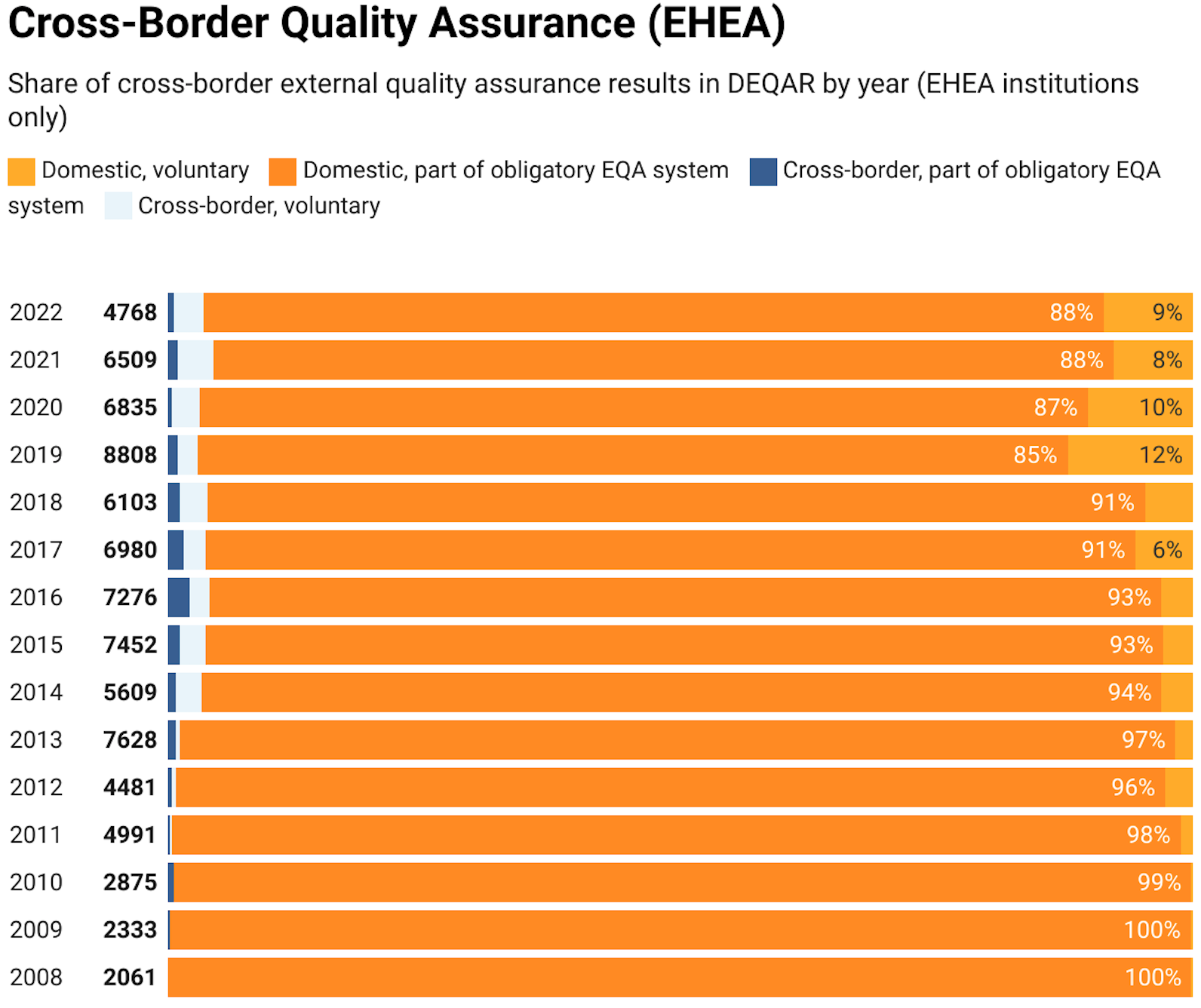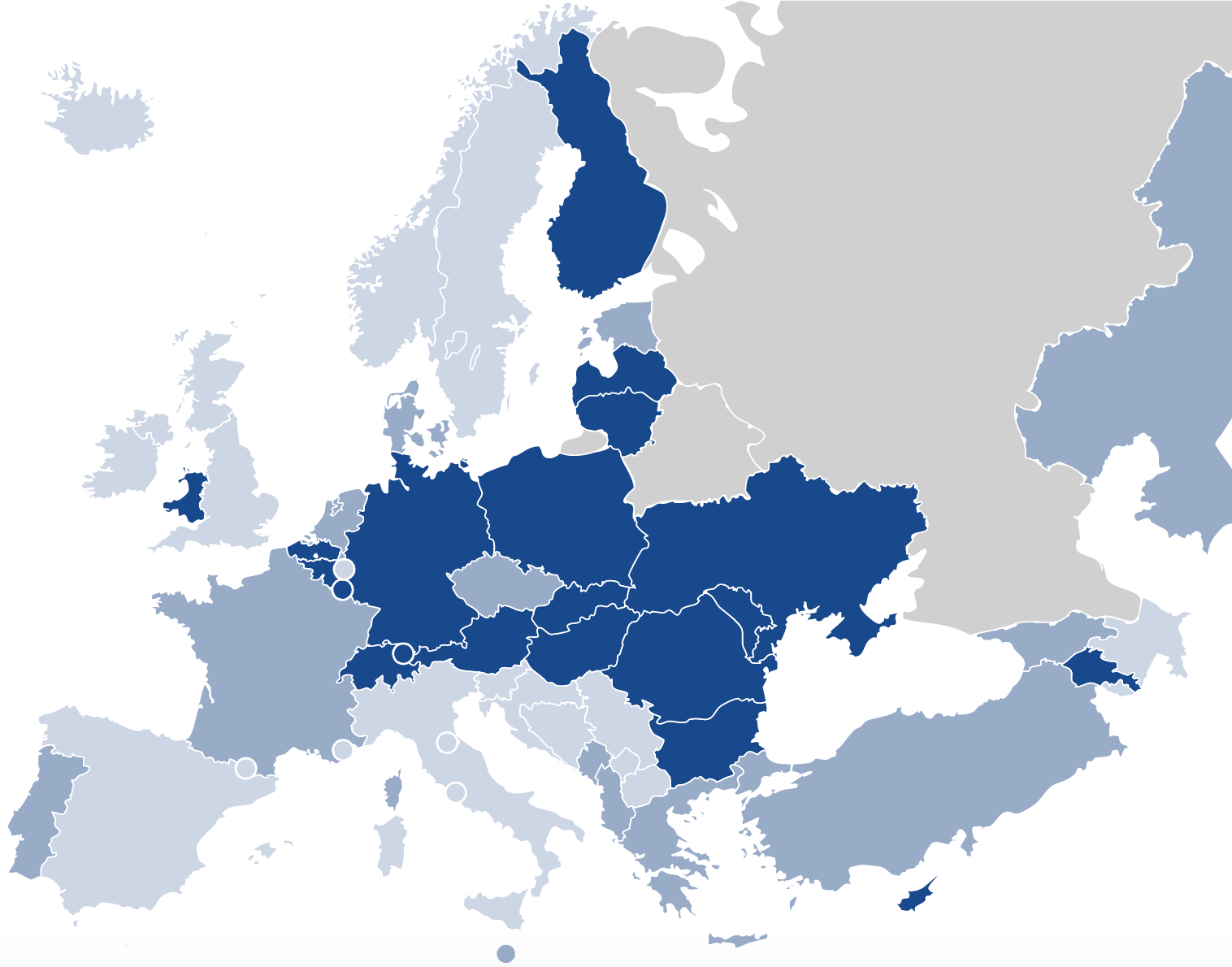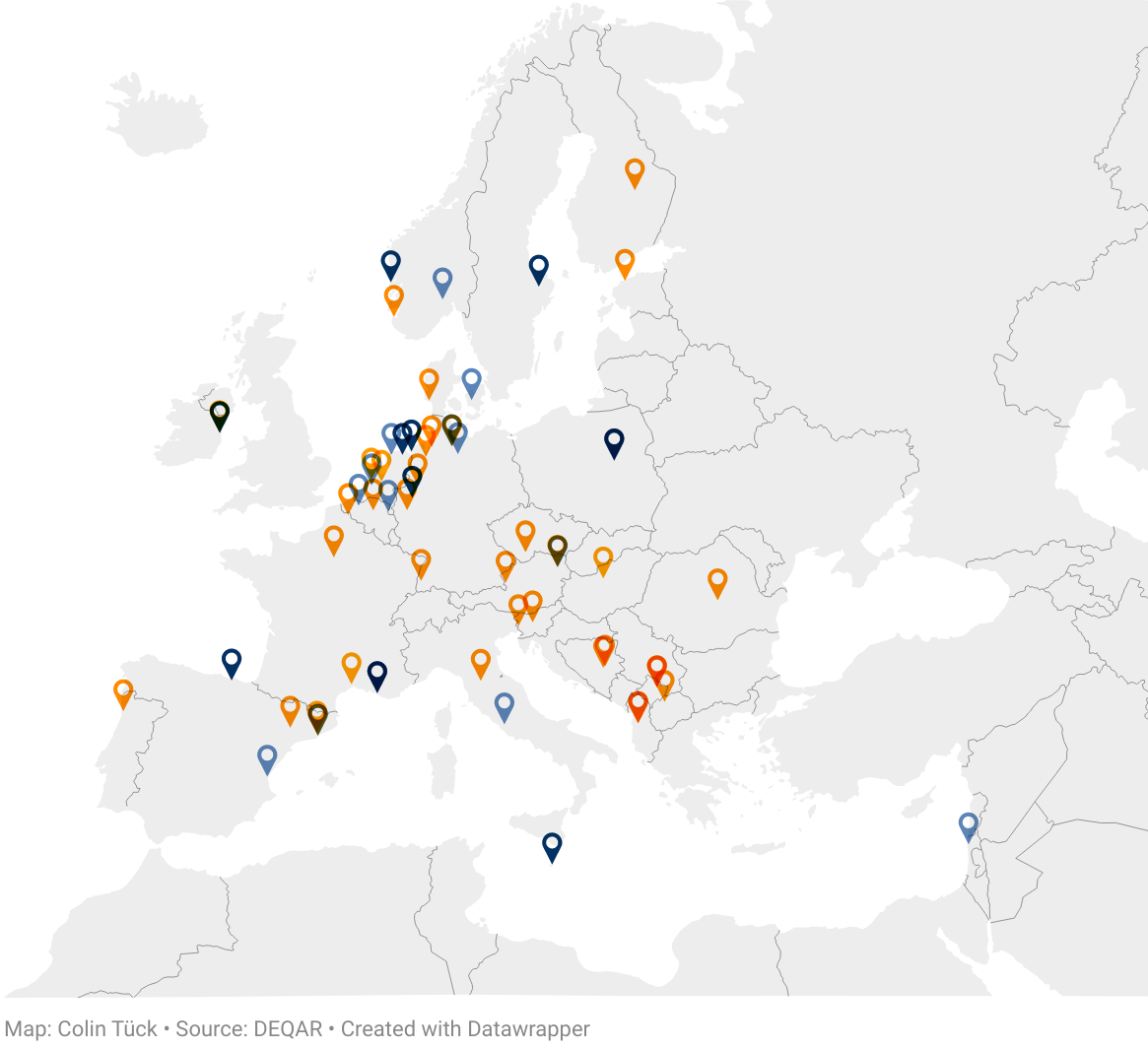Contributing to the Development of the EHEA
Contribution to the EHEA Work Plan and projects
EQAR contributes to the European Higher Education Area (EHEA) working structures as well as to other relevant European policy developments following closely its plan of work.
In 2022, EQAR supported the implementation of EHEA reforms in the meetings of the Bologna Follow-up Group and its working structures (Thematic Peer Group on QA, Thematic Peer Group on Recognition, WG 1 on Monitoring the Implementation and Task Force on Enhancing Knowledge Sharing in the EHEA). As part of the BFUG Monitoring Working Group (WG1), EQAR contributed to the discussion on the main scorecard indicators to be used in the 2024 Implementation Report on quality assurance and recognition. In the meetings of the Thematic Peer Group on Quality Assurance (TPG C), EQAR contributed to the discussions on legal frameworks aligned with the ESG, cross-border QA and the European Approach, while in the meetings of the Thematic Peer Group on Recognition (TPG B) EQAR supported the survey and data gathering process on the digitalisation of credentials and implementation of LRC principle.
Through its involvement in various projects (see also Projects below) and events, EQAR fed its expertise into relevant discussions and initiatives related to quality assurance (e.g. the proposal of a European Degree label, the possible European Approach for QA of European University alliances, possible revision of the EU Recommendation on Quality Assurance, the European Higher Education Sector Observatory), amongst others through the EEA Higher Education Working Group and ETER Advisory Board.
In 2022, EQAR continued to monitor developments in external QA at system level across the EHEA and to maintain the knowledge base of national/regional frameworks for external quality assurance through the QA FIT survey of national ministries (see more about QA FIT here).
In supporting the EHEA commitment on the ‘alignment of the legal frameworks with the ESG’, EQAR prepared an analysis (following a Peer Learning Activity under the same topic, see more under IMINQA project) on the key issues on external and internal QA as well as on the barriers to ESG compliance. As part of the SEQA-ESG project, EQAR was invited to bring its contribution in a number of progress visits with QA agencies and ministries from countries where alignment with the ESG is still lagging behind.
Apart from that, EQAR also contributed by means of various task force and peer-learning activities on digitalisation, Diploma Supplement and microcredentials.
EQAR continued its work on integrating DEQAR data in the European Digital Credentials for Learning ecosystem. HEIs that have their reports in DEQAR can now automatically issue external QA results as EBSI-compatible Verifiable Credentials (VC). EQAR has further improved the interface to export/transfer DEQAR data to the Europass Qualifications Dataset Register (QDR).
Openness to cross-border external QA with an EQAR-registered agency
As of 2022, the availability of cross-border external quality assurance (QA) with an EQAR-registered agency remains unchanged from the previous year. Higher education institutions in 21 countries (shown on the map as dark blue) are eligible for cross-border QA, while 13 other countries (shown as medium dark blue) allow recognition of procedures with EQAR-registered agencies under certain conditions. In 2022 only 19% of procedures have been recognised as part of the national external QA framework. DEQAR data also show that during the pandemic the share of recognised cross-border QA procedures (22% for 2021, and 12% in 2020) was lower that the general share of recognised procedures before 2020 (30% of procedures were recognised between 2008 to 2019).
Considering the share of cross-border external QA activities and domestic procedures within EHEA, we find that this has not changed in 2022 compared to previous years, i.e. figures remain at around 3% for cross-border QA and 97% for domestic procedures. However, overall, the activities of QA agencies for domestic and cross border procedures have decreased in recent years (see figure below on the overall numbers of procedures).
The slow pace of development in legal frameworks may be attributed to the pandemic as well as to the lower number of external QA procedures. The pandemic has likely also shifted priorities away from legal provisions that allow higher education institutions to request accreditation, evaluation, or audit from EQAR-registered agencies, so that the openness of legal framework has seen little to no progress in these years.
More information on the cross-border external QA activities of EQAR-registered agencies can be consulted on our website here.


Use of the European Approach for Quality Assurance of Joint Programmes
In 2022, the European Approach for Quality Assurance of Joint Programmes (EA) was available to higher education institutions in 21 higher education systems (map: dark blue); in six of those the European Approach is available by virtue of external quality assurance being required at institutional level only.
Despite frequent policy discussions highlighting the importance of the European Approach in the context of the European Universities initiative, there was little progress compared to 2021: only in Spain, new legislation entered into force that allows a broader use of the European Approach compared to before. Regardless of that, the attention in policy discussions remained significant, especially from the side of European University Alliances; EQAR was invited to present the European Approach and the state of implementation at several events in 2022.
In 11 EHEA systems, the European Approach was only available to some higher education institutions or subject to specific, additional conditions (map: light blue). The map below gives an overview, the information on each country provides further details, such as an explanation of a specific legislation or the fact that higher education institutions themselves are responsible for the quality assurance of their programmes. In 19 EHEA systems, higher education institutions remain unable to use the European Approach as of 2022, creating an additional burden for those institutions when engaging in international cooperation.
EQAR has maintained a specific page on its website with a list of example cases where the European Approach was used, to allow others to draw from these experiences. Until the end of 2022, 19 external quality assurance procedures had been completed in line with the European Approach based on information available in DEQAR; the table below show the agencies that have carried out those reviews. These procedures cover programmes offered by 78 higher education institutions spanning 24 EHEA systems (see map below). The average size of the consortia is approximately four institutions.
| Agency | Number of reports |
|---|---|
| AQ Austria | 2 |
| AQAS | 6 |
| AQU | 2 |
| ASHE | 1 |
| HCERES | 2 |
| NVAO | 4 |
| Unibasq | 1 |
| VLUHR QA | 6 |
| ZEvA | 1 |
NB: For practical reasons, EQAR is unable to keep track of European Approach reviews that have not been added to DEQAR. Some institutions have contacted EQAR regarding their European Approach accreditation not showing up in the list, EQAR has encouraged the respective agency to upload those reports manually even if it unable to upload its other external QA reports to DEQAR at this stage.
The numbers above also do not include any institutions that might have used the European Approach in their internal QA arrangements, e.g. in cases where no external programme accreditation/review is required, as there is no reporting on such cases.

-
European Approach
IMINQA project
The different activities organised as part of the Implementation and Innovation in QA through Peer Learning (IMINQA) project aim to support the work of the Bologna Thematic Peer Group C on Quality Assurance, focusing on the implementation of the key commitment in all EHEA countries.
In September 2022, EQAR with support of ENQA and the Flemish Department of Education and Training organised a Peer Learning Activity (PLA) on ‘Aligning the legal frameworks with the ESG’ (1st September). The event facilitated the exchange on effective approaches to implement QA policies, discussed challenges on aligning the legal framework with the ESG in national/local systems and countries’ experiences with the implementation of a QA framework aligned with the ESG. A thematic preparatory note was prepared to feed into the group discussion. The analysis was further complemented with the discussions from the event (read here the final thematic analysis).
As part of the project activities, EQAR also started working on developing a data model for alternative providers and micro credentials in DEQAR. The first draft was presented to EQAR’s members in December 2022. The feedback provided by the governmental members was later used for updating the data model.
EQAR is also involved in the matchmaking committee of the IMINQA project, overseeing the process of staff mobility for those working in QA and furthering the work of the Thematic Peer Group on QA. In 2022 the matchmaking committee reviewed 41 applications for staff mobility that mostly made by QA agencies (34), followed by ministries (4) and stakeholder organisations (3).
QA-FIT project
The Quality Assurance Fit for the Future (QA-FIT) project, led by ENQA , aims to gather comprehensive evidence and reflect if and how the current EHEA framework of the ESG is perceived to limit the responsiveness of quality assurance to trends and innovations in higher education. More specifically, the project will:
- Conduct a comprehensive mapping exercise of the state of play of internal and external quality assurance in the EHEA.
- Take a critical look at the ESG and see how they have been adapted to different contexts.
- Explore how quality assurance activities are addressing recent and emerging developments in higher education including activities that go beyond the focus of the ESG and that use innovative approaches, and gather perspectives on the future of quality assurance in the EHEA.
- Conclude with the development of policy messages to be taken up in EHEA policy discussions.
The projects activities include desk research, four surveys on the ESG implementation, four reports and four focus groups including one with national ministries (led by EQAR), a final report, a final webinar and then a final policy event.
EQAR was in charge of drafting the survey on ESG implementation for the national ministries. This survey was launched in November 2022, together with three other surveys targeting each stakeholder group (higher education institutions, national student unions and quality assurance agencies).
TPG-LRC CoRE project
The project is led by the Information Centre on Academic Mobility and Equivalence (CIMEA) and aims to support the work of the Thematic Peer Group B on the Lisbon Recognition Convention (TPG B on LRC) .
The main project activities involve panel discussions and peer learning activities on common challenges (i.e. recognition of knowledge gained through alternative pathways, micro credentials, digitalisation of recognition workflows, European Degree etc.) and research that will further enable peer learning.
Work group on digitalisation of recognition tools
EQAR is leading the work group on digitalisation of recognition tools. The work group meets on a monthly base and has the following aims:
- To organise three peer learning webinars in the autumn of 2023 focusing on good practices on implementing digital tools and discussions on the main challenges and successes.
- To publish a guide “Digitalisation of Recognition Tools”, which will present both good practices and offer practical advice on digitalising recognition workflows, to be used by ENIC NARICs, recognition offices at HEIs and other actors in the field.
- To organise two workshops on digitalisation of the diploma supplement and the connection to the European Learning Model (i.e. standards).
Work group of quality assurance of recognition
EQAR contributes to another work group within the project, with the aim of exploring the internal and external quality assurance processes of HEIs. For this purpose, at the end of 2022, a questionnaire exploring the internal quality assurance of the recognition processes of HEIs was launched and disseminated through BUFG and EUA channels.